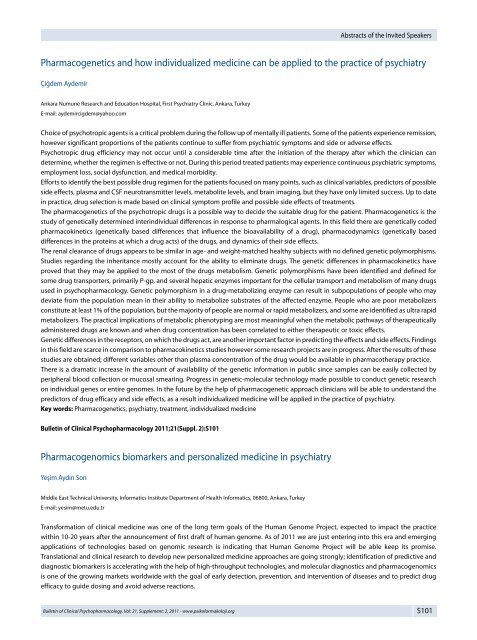SYMPOSIA
SYMPOSIA
SYMPOSIA
You also want an ePaper? Increase the reach of your titles
YUMPU automatically turns print PDFs into web optimized ePapers that Google loves.
Bulletin of Clinical Psychopharmacology, Vol: 21, Supplement: 2, 2011 - www.psikofarmakoloji.org<br />
Abstracts of the Invited Speakers<br />
Pharmacogenetics and how individualized medicine can be applied to the practice of psychiatry<br />
Çiğdem Aydemir<br />
Ankara Numune Research and Education Hospital, First Psychiatry Clinic, Ankara, Turkey<br />
E-mail: aydemircigdem@yahoo.com<br />
Choice of psychotropic agents is a critical problem during the follow up of mentally ill patients. Some of the patients experience remission,<br />
however significant proportions of the patients continue to suffer from psychiatric symptoms and side or adverse effects.<br />
Psychotropic drug efficiency may not occur until a considerable time after the initiation of the therapy after which the clinician can<br />
determine, whether the regimen is effective or not. During this period treated patients may experience continuous psychiatric symptoms,<br />
employment loss, social dysfunction, and medical morbidity.<br />
Efforts to identify the best possible drug regimen for the patients focused on many points, such as clinical variables, predictors of possible<br />
side effects, plasma and CSF neurotransmitter levels, metabolite levels, and brain imaging, but they have only limited success. Up to date<br />
in practice, drug selection is made based on clinical symptom profile and possible side effects of treatments.<br />
The pharmacogenetics of the psychotropic drugs is a possible way to decide the suitable drug for the patient. Pharmacogenetics is the<br />
study of genetically determined interindividual differences in response to pharmalogical agents. In this field there are genetically coded<br />
pharmacokinetics (genetically based differences that influence the bioavailability of a drug), pharmacodynamics (genetically based<br />
differences in the proteins at which a drug acts) of the drugs, and dynamics of their side effects.<br />
The renal clearance of drugs appears to be similar in age- and weight-matched healthy subjects with no defined genetic polymorphisms.<br />
Studies regarding the inheritance mostly account for the ability to eliminate drugs. The genetic differences in pharmacokinetics have<br />
proved that they may be applied to the most of the drugs metabolism. Genetic polymorphisms have been identified and defined for<br />
some drug transporters, primarily P-gp, and several hepatic enzymes important for the cellular transport and metabolism of many drugs<br />
used in psychopharmacology. Genetic polymorphism in a drug-metabolizing enzyme can result in subpopulations of people who may<br />
deviate from the population mean in their ability to metabolize substrates of the affected enzyme. People who are poor metabolizers<br />
constitute at least 1% of the population, but the majority of people are normal or rapid metabolizers, and some are identified as ultra rapid<br />
metabolizers. The practical implications of metabolic phenotyping are most meaningful when the metabolic pathways of therapeutically<br />
administered drugs are known and when drug concentration has been correlated to either therapeutic or toxic effects.<br />
Genetic differences in the receptors, on which the drugs act, are another important factor in predicting the effects and side effects. Findings<br />
in this field are scarce in comparison to pharmacokinetics studies however some research projects are in progress. After the results of these<br />
studies are obtained; different variables other than plasma concentration of the drug would be available in pharmacotherapy practice.<br />
There is a dramatic increase in the amount of availability of the genetic information in public since samples can be easily collected by<br />
peripheral blood collection or mucosal smearing. Progress in genetic-molecular technology made possible to conduct genetic research<br />
on individual genes or entire genomes. In the future by the help of pharmacogenetic approach clinicians will be able to understand the<br />
predictors of drug efficacy and side effects, as a result individualized medicine will be applied in the practice of psychiatry.<br />
Key words: Pharmacogenetics, psychiatry, treatment, individualized medicine<br />
Bulletin of Clinical Psychopharmacology 2011;21(Suppl. 2):S101<br />
Pharmacogenomics biomarkers and personalized medicine in psychiatry<br />
Yeşim Aydın Son<br />
Middle East Technical University, Informatics Institute Department of Health Informatics, 06800, Ankara, Turkey<br />
E-mail: yesim@metu.edu.tr<br />
Transformation of clinical medicine was one of the long term goals of the Human Genome Project, expected to impact the practice<br />
within 10-20 years after the announcement of first draft of human genome. As of 2011 we are just entering into this era and emerging<br />
applications of technologies based on genomic research is indicating that Human Genome Project will be able keep its promise.<br />
Translational and clinical research to develop new personalized medicine approaches are going strongly; identification of predictive and<br />
diagnostic biomarkers is accelerating with the help of high-throughput technologies, and molecular diagnostics and pharmacogenomics<br />
is one of the growing markets worldwide with the goal of early detection, prevention, and intervention of diseases and to predict drug<br />
efficacy to guide dosing and avoid adverse reactions.<br />
S101



